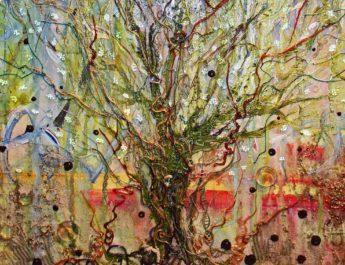Ephesians 5:8-14
Fourth Sunday in Lent A
8 for once you wereA darkness,B but now in the LordC you are light.D
A “were” = eimi. This is to be, exist.
B “darkness” = skotos. Perhaps from the base of skia (shadow, thick darkness, outline; figurative for a spiritual situation that is good or bad). This is darkness literal or figurative – as moral or spiritual darkness, sin and what comes from it. This can also mean obscurity.
C “Lord” = Kurios. From kuros (authority, supremacy). This is a respectful address meaning master or sir. It refers to one who has control or power greater than one’s own. So, it was also applied to God and Jesus as Master or Lord.
D “light” = phos. From phao (to shine or make visible, especially with rays of light); from the same as phaino (to bring light, cause to appear, shine, become visible or clear). This is light, a source of light, fire, or radiance. This is light with specific reference to what it reveals. It is luminousness whether natural or artificial, abstract or concrete, literal or figurative.
WalkE as childrenF of light, 9 for the fruitG of the light
E “walk” = peripateo. From peri (about, concerning, around, encompassing) + pateo (to read, trample on; to trample literally or figuratively); {from patos (trodden) OR from paio (to strike, smite, sting; a hit like a single blow)}. This is to walk. Going from Hebrew figurative language, to walk referred to how you conducted your life, how you chose to live. This word is most literally walking around. Figuratively, it is living, behaving, following, how you occupy yourself. This is where “peripatetic” comes from.
F “children” = teknon. From tikto (to beget, bring forth, produce). This is a child, descendant, or inhabitant.
G “fruit” = karpos. Perhaps from harpazo (to seize by force, snatch away); from haireo (to choose, take). This is a fruit or vegetable, through sometimes it refers to an animal. Figuratively, it is deeds, results, profits, or gain.
is found in allH that is goodI and rightJ and true.K
H “all” = pas. This is all, every.
I “good” = agathosune. 4x in NT. From agathos ((good, a benefit, or a good thing; good by its very nature, inherently good). This is goodness as an intrinsic quality in the sense of being kind/good-natured rather than good versus evil.
J “right” = dikaiosune. From dikaios (correct, righteous – implies innocent; this is that which conforms to God’s notion of justice, uprightness); from dike (the principle of justice; that which is right in a way that is very clear; a decision or the execution of that decision; originally, this word was for custom or usage; evolved to include the process of law, judicial hearing, execution of sentence, penalty, and even vengeance; more commonly, it refers to what is right); may be from deiknumi (to show, point out, exhibit; figurative for teach, demonstrate, make known). This is judicial or divine approval of character or action. This is righteousness, justice, justness, divine righteousness.
K “true” = aletheia. From alethes (true, unconcealed; true because it is in concert with fact and reality – attested; literally, what cannot be hidden; truth stands up to test and scrutiny and is undeniable, authentic). {from a (not, without) + lanthano (unnoticed, concealed)}. Truth is literally that which is not or cannot be concealed. This word covers more than the sense of true versus false. It spoke of truth as that which corresponds to reality – reality as opposed to illusion. Thus, it includes, sincerity, straightforwardness, and reality itself.
10 Try to find outL what is pleasingM to the Lord. 11 Take no partN
L “try to find out” = dokimazo. From dokimos (what passes the test, approved, acceptable, genuine, verified); from dechomai (to warmly receive, be ready for what is offered, take, accept, or welcome; to receive in a literal or figurative sense) or dokeo (to have an opinion, seem, appear, suppose; a personal judgment; to think); {from dokos (opinion)}. This is to test, examine, prove. It is to approve after subjecting to a test to determine if it is real or acceptable. It is to test in a literal or figurative sense.
M “pleasing” = euarestos. 9x in NT. From eu (good, well done, rightly); {from eus (good)} + aresko (to please or be agreeable; implies voluntarily serving others, satisfying others, or making good to win their favor or approval; often used for moral agreement; being agreeable or trying to be agreeable); {perhaps from airo (raise, take up, lift, remove)}. This is literally well-pleasing – often used of something that is pleasing or acceptable to God.
N “take…part” = sugkoinoneo. 3x in NT. From sun (with, together with) + koinoneo (to share, have fellowship, distribute); {from koinonos (partner, companion, partaker, sharer); {from koinos (common, shared, unclean, ritually profane); probably from sun (with, together with)}}. This is to share, take part, have fellowship.
in the unfruitfulO worksP of darkness; rather,Q exposeR them.
O “unfruitful” = akarpos. Related to “fruit” in v9. 7x in NT. From a (not, without) + karpos (see note G above). This is unfruitful or barren. It can be used in a literal or figurative sense.
P “works” = ergon. From ergo (to work, accomplish, do). This is work, task, deed, labor, effort.
Q “rather” = mallon. This is rather, more than, or better.
R “expose” = elegcho. 17x in NT. This is to expose, reprove, discipline, convict, or rebuke. It is using convincing evidence to expose a wrong.
12 For it is shamefulS even to mentionT what such people doU secretly,V 13 but everythingW exposed by the light becomes visible,X 14 for everything that becomes visible is light.
S “shameful” = aischros. 4x in NT. From the same as aischuno (to dishonor, put to shame, shrink, disfigure); from aischos (shame, disgrace, disfigurement). This is disgraceful, shameful, sordid, filthy.
T “mention” = lego. This is to speak, say, name, call, command. It is generally to convey verbally.
U “do” = ginomai. This is to come into being, to happen, become, be born. It can be to emerge from one state or condition to another or is coming into being with the sense of movement or growth.
V “secretly” = kruphe. 1x in NT. From krupto (to hide by covering, secret, hidden things). This is secretly or privately.
W “everything” = pas. Same as “all” in v9. See note H above.
X “becomes visible” = phaneroo. Related to “light” in v8. From phaneros (visible, apparent, clear, shining); from phos (see note D above). This is to make visible or clear, to make known. Properly, it is to illumine and so to make apparent or bring into open view.
Therefore it says,Y
“Sleeper,Z awake!AA
Y “says” = lego. Same as “mention” in v12. See note T above.
Z “sleeper” = katheudo. From kata (down, against, throughout, among) + heudo (to sleep). This is to settle down to rest, to sleep, fall asleep in a literal or figurative sense.
AA “awake” = egeiro. This is to awake, raise up or lift up. It can be to get up from sitting or lying down, to get up from sleeping, to rise from a disease or from death. Figuratively, it can be rising from inactivity or from ruins.
RiseBB from the dead,CC
and ChristDD will shineEE on you.”
BB “rise” = anistemi. From ana (upwards, up, again, back, anew) + histemi (to make to stand, place, set up, establish, appoint, stand by, stand still, stand ready, stand firm, be steadfast). This is to raise up, rise, appear. It is to stand up literally or figuratively. Can also mean to resurrect.
CC “dead” = nekros. Perhaps from nekus (corpse). This is dead or lifeless, mortal, corpse. It can also be used figuratively for powerless or ineffective. It is where the word “necrotic” comes from.
DD “Christ” = Christos. From chrio (consecrate by anointing with oil; often done for prophets, priests, or kings). Literally, the anointed one, Christ. The Greek word for Messiah.
EE “shine” = epiphausko. 1x in NT. Related to “light” in v8 & “becomes visible” in v13. From epiphosko (grow light or let shine. It can mean to dawn or be about to start); {from epi (on, upon, among, what is fitting) + phos (see note D above)}. This is to shine or illuminate in a literal or figurative sense.
Image credit: “Walking on Broken Light” by halfrain, 2011.




